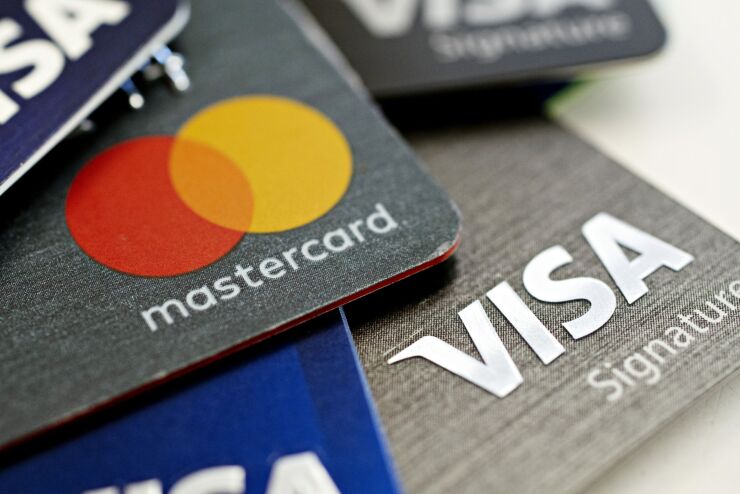Last year the major card networks decided, amid the pandemic, to hold off on adjusting
However, Visa has indicated it intends to take into account the pandemic's continuing effect.
Visa will make "a small number of changes to reflect the evolution of digital payments to online, [and to] enhance security and optimize acceptance and usage," according to a prepared statement.
Card networks set interchange fees for acquiring banks to pay issuing banks, but the cost is passed on to merchants. Of particular concern are card-not-present rates, which are presumed to be higher risk even though they cover online and mobile transactions that carry strong authentication such as biometrics.
"Specifically, we have decided to leave consumer credit-card-present rates unchanged in light of the fact that in-person retail continues to recover. In addition, Visa will provide a lower rate for certain card-not-present consumer credit transactions processed using a Visa EMV payment token as of October 2021," Visa said.

Mastercard similarly confirmed it would move forward with fee changes in April, noting that its intention to do so last year marked the first time in 10 years the brand was going to adjust its rates.
"The changes include both increases as well as decreases across all small-ticket transactions and decreases in categories like car rental, lodging, certain restaurants and daycare," Mastercard said in a media statement. "These changes were planned before the pandemic and have been delayed for a year. We recognize the challenges merchants are facing and will continue to be thoughtful about the timing of implementation."
Depending on the vertical and the interchange tier or method being deployed, merchants generally pay about 2% to 3% of their customers' credit card purchases. Often, merchants or federal lawmakers have questioned the practice, and the card networks' policies have often changed only as the result of court settlements.
Merchants have also been listening closely to acquirers and their tech partners about various payment method options that could lessen their reliance on credit card acceptance — not the least of which is the growing
"The long, feudal tradition of the networks assessing their taxes, interchange and other fees in this case, on the merchant serfs every planting season in April and harvest in October was broken by COVID last year — and the merchants might have gotten used to not being 'taxed' arbitrarily," said Steve Mott, principal of the consulting firm BetterBuyDesign. "When the networks go back to the well in April to revive the tradition, they're probably counting on merchants having a short memory."
That's not likely, Mott noted.
"A lot of them have been doing their homework on payment options during COVID, and except for the few who are being placated by network subsidies and concessions, the vast majority of merchants I talk to appear more militant than ever to seek real choices and freedom from financial oppression," he said.
Late last year, the Atlanta-based research firm
And just last month, CMSPi provided its April 2021 interchange report, which estimated a total aggregate impact of $383 million for Mastercard interchange increases, and a $768 million annual cost increase for Visa's changes. The report indicated some fee restructuring was still taking place.
It also noted that Visa's adjustments to all four of its transaction volume tiers in the grocery sector in July of 2020 resulted in cost decreases for merchants of $262 million. It was feared, however, that the growth of online grocery and curbside pickups using higher-cost, card-not-present transactions would offset savings.
Mostly, what stands out in the CMPSi report is the combination of the two major card networks expected increases coming out to $898 million.
"We are not calling out Visa or Mastercard in these reports; the figures are estimates to help merchants understand the changes," said report author Alex Ellwood, vice president of merchant advocacy at CMSPi. "Retail payments are complex and ever-changing — and this has been super-charged by the pandemic."
Ellwood noted that the card brands have other more variable fees — for network upgrades, changes in issuance patterns, or growth of online payment channels — that change on a somewhat regular basis, but April's adjustments mark "the first set of fundamental changes to interchange fees that we've seen in a decade."
Ultimately, the report surmises, a significant portion of the hundreds of interchange fee categories will be impacted by the fee adjustments. "All part of complex charging structures that merchants must navigate," the report stated.
The process leaves merchants with little recourse for the immediate future.
"It doesn't look like the networks are backing down at all this round," said John Drechny, CEO of the Merchant Advisory Group. "It is unfortunate they are proceeding with these changes with so many merchants still suffering from the pandemic."
In addition, the Merchants Payments Coalition threw its support behind the efforts of Sen. Dick Durbin of Illinois and Rep. Peter Welch of Vermont, who sent a letter to Visa and Mastercard calling on the card brands to cancel what they estimated as April's $1.2 billion increase in credit card processing fees.
"These increases come at the worst possible time," MPC counsel Doug Kantor said in the coalition's press release. "Merchants have been struggling for a full year to survive the economic impact of the pandemic and cannot afford an unnecessary and avoidable cost increase. U.S. credit card swipe fees are already among the highest in the world, and now is not the time to increase them."
Durbin and Welch urged the card brands to consider that the COVID-19 vaccinations are just starting to give merchants some hope and the increases would, in effect, be the brands "slamming struggling merchants and, by extension, consumers with fee increases."





